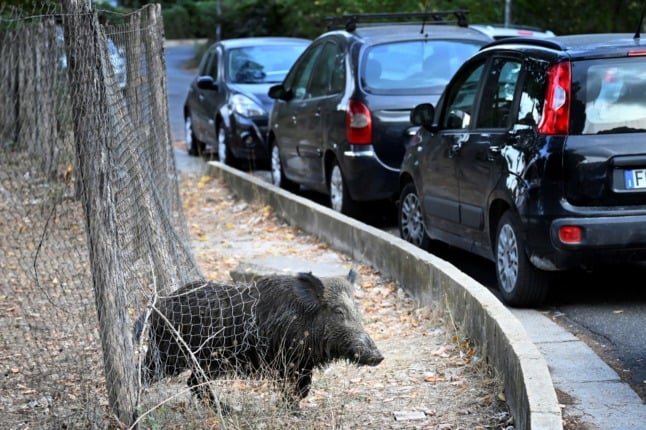Across the country from the Eternal City to Milan, Naples and Bologna, voters are heading to the polls until Monday for municipal elections being closely watched as a bellwether ahead of 2023 general elections.
But in Rome – one of the world’s filthiest cities, according to a ranking last month by the British magazine Time Out – residents are more concerned with the perennial transport, flooding, waste and pothole woes in this city of 2.8 million inhabitants.
So bad is the rubbish management that wild boars are regularly seen wandering in residential areas, attracted by the pile-up of waste.
WATCH: Videos of wild boars ‘invading’ Rome streets go viral in Italy
In the picturesque neighbourhood of Trastevere, where bins often overflow onto the cobblestones, 60-year-old resident Tiziana De Silvestro, out walking her dog, said the root of the problem was rubbish left overnight outside bars and restaurants.
“Now the city is full of animals, crows, seagulls, not to mention mice and cockroaches,” she said.
READ ALSO: ‘The great rubbish dump’: Why Romans are fed up with the state of their city
Rome’s current mayor, Virginia Raggi from the anti-establishment Five Star Movement (M5S), has won praise for taking on the city’s fierce new mafia, the Casamonica family of loan sharks and drug traffickers.
But her widely mocked plans to use sheep as lawnmowers and bees to combat pollution – while rotting refuse piles up next to playgrounds, buses spontaneously combust in the heat and weeds run wild – may cost her dearly.
The candidate of the right-wing alliance, Nicola Michetti, is likely to pocket the most votes thanks to a split on the left, according to the last polls published before a pre-election blackout.
But he is not predicted to garner more than the 50 percent of votes needed to avoid a run-off in two weeks — and polls say he may then lose in round two to the Democratic Party’s Roberto Gualtieri, a former economy minister.
Michetti, a 55-year-old former lawyer, warns: “today we have seagulls and boars, tomorrow it could be cholera”.
His champion is the head of far-right Brothers of Italy party Giorgia Meloni, who said Rome has become an international joke.
Gualtieri and rival centre-left candidate Carlo Calenda, meanwhile, have called for round tables with experts to tackle the problem of the wild boars.
Some 12 million voters are eligible to cast ballots in the elections, which are being held not only in the country’s largest cities but in more than 1,000 smaller centres, including Morterone in Lombardy, which has just 33 inhabitants.
Turnout as of 7pm on Sunday was a little more than 33 percent nationally and just under 30 percent in Rome.



 Please whitelist us to continue reading.
Please whitelist us to continue reading.
Member comments